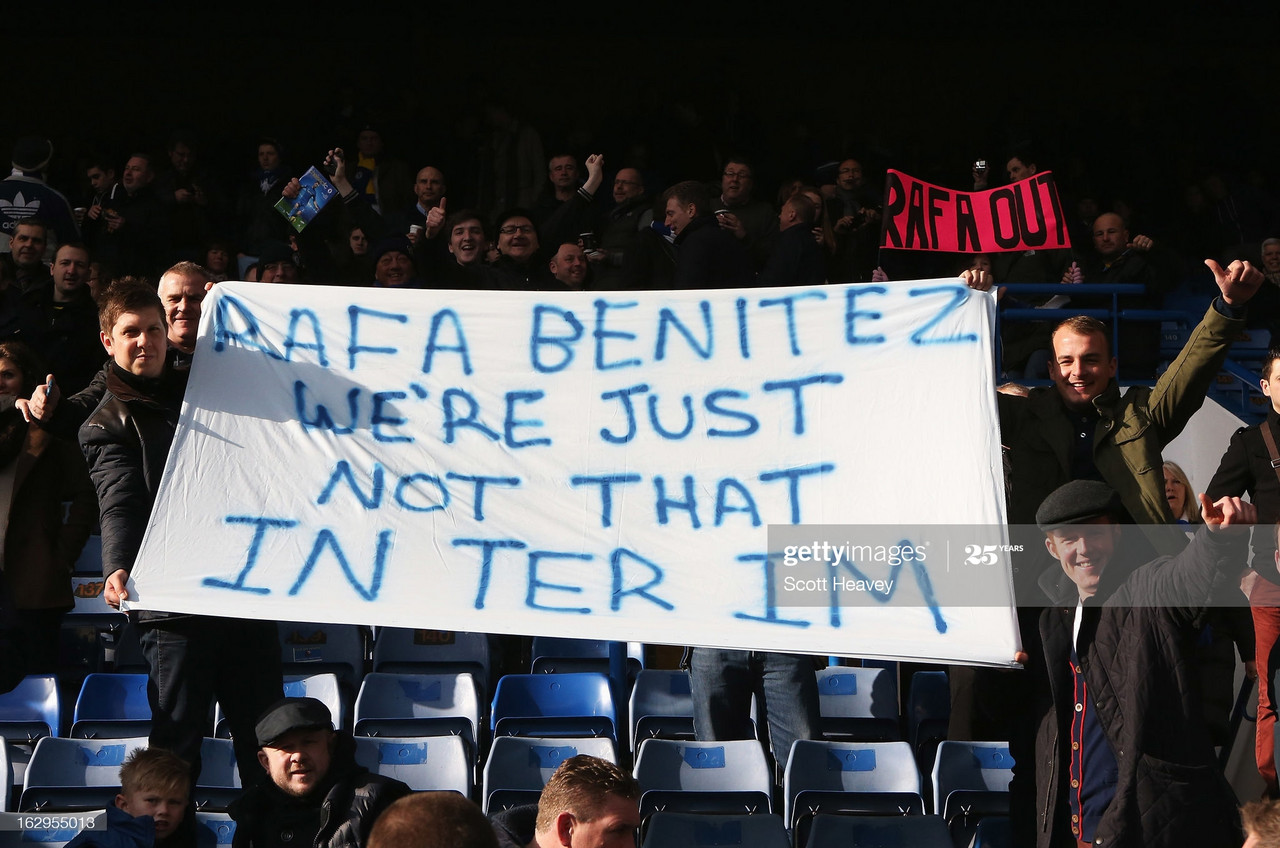Two notable things happened in 2012 that changed the outlook of Chelsea Football Club and its supporters: the first happened in May 2012, when Chelsea defied all the odds to beat Bayern Munich on penalties to win the UEFA Champions League for the first time in their history, the ultimate goal of owner Roman Abramovich after his take over in 2003.
The appointment of Benitez
The second was the appointment of former Liverpool manager Rafa Benítez as interim manager in December 2012, replacing Roberto Di Matteo after a poor start to the 2012/13 which saw Chelsea's defence of their Champions League title fall at the group stages.
Benitez's appointment proved massively controversial amongst the Chelsea fanbase, with, particularly those who regularly attend matches at Stamford Bridge, being very vocal about their displeasure of Benitez being given the job after previous comments made about Chelsea fans when he was Liverpool boss.
From this point, it was clear to see division in the fanbase, as interpretations of Chelsea's ambition were becoming more apparent in how they differed.
Prior to this in the Abramovich era, the target was pretty simple for Chelsea managers: win the Champions League, or you will soon be out the door.
This was ultimately understood as being the case for Chelsea fans as well: the Champions League was the holy grail for the club, and this should be the priority in deciding whether a certain manager was right or wrong for the club, which ultimately lead to six sackings in the nine year period before the Champions League victory.
However, the circumstances of said Champions League win was such that it was not going to be likely that Chelsea would do it again: reliant on luck, defensive stability, and with an aging squad in what has been called a 'last dance' for most of the key squad members, it is a feat that could not be compared to something such as Real Madrid's three Champions League wins in a row: history would not repeat itself, not in the short term at least.
However, there will always be sections of the fanbase that sees it as the benchmark for success: winning trophies is a great habit to get into, and not winning a trophy is considered by some as a failure, particularly following Carlo Ancelotti's sacking after a trophyless season in 2010/11, despite warm feelings towards the style of play he introduced and coming just a year after the club's only Premier League and FA Cup double to date, in 2009/10.
Meanwhile for others, retaining the right morals and culture surrounding the club was priority, hence the negative response to Benitez's appointment.
When appointed, no one expected miracles from Benítez, in fact, a lot of Chelsea fans were calling for his sacking before he stepped out the tunnel at Stamford Bridge for his first game in charge against Manchester City, and was widely booed by home supporters at that game. It was completely personal, and not to do with how he was as a manager at all.
Come the end of the season in 2012/13, Chelsea did reasonably well: a 3rd place finish in the Premier League, an improvement of three positions from the previous campaign, plus a Europa League win under the belt - it can be looked back upon as fairly successful.
The way that Benítez got the best out of struggling striker Fernando Torres, as well as out of playmaker Juan Mata, was impressive, and by the end of the season, with the end of his contract being imminent, some fans started to change their minds on him and were more appreciative of the job he did.
This is not a one off case, as all the appointments of managers post-2012 has seen division in someway or another.
Match-going fans have generally been appreciative of the managers appointed, with many defending Jose Mourinho even over some of the star players at the club during Chelsea's dismal start to the 2015/16 season which saw them battling in the bottom half of the Premier League table.
This was mostly due to the goodwill that they had towards him, largely influenced by his first spell at the club.
The support and criticism of Antonio Conte
This was a similar case with Antonio Conte, who himself had built up a good rapport with match-going fans in his first season at the club, so when a bad spell of form came during his second season in charge, he generally received strong support from the Stamford Bridge faithful.
While this was going on, the greatest boom of social media criticism of the club was unfolding, with immense displeasure in the team's performances, negative tactics, and underperforming signings saw a strong underlying support in wanting Conte to be sacked, which was not necessarily sensed within the fans at games, but could be sensed in the attitude of the squad, especially in comparison to the previous season.
The way that Conte was managing the squad during the 2017/18 was ultimately damaging to club as a global brand more than anything else: missing out on Champions League football for the following season was damaging for the widespread appeal for the viewership of matches, there was no chance of competing for the biggest prize in club football, and it also hurt the club's chances of signing big-name players, something which is a factor in gaining worldwide support.
This is evidenced, for example, in the strong contingency of African Chelsea supporters, which came from Chelsea having some of the best African players in the world during the 2000s and early 2010s.
The arrival of Maurizio Sarri
The events of the 2017/18 ultimately resulted in Conte's sacking, and he was replaced in the Chelsea hot seat by fellow Italian Maurizio Sarri.
What occurred that season is perhaps the most notable example of fan division in the Abramovich era: where the interpretations of the job that Sarri was doing differed dependent on where priorities lied.
On social media, especially amongst fans that are perhaps more greatly versed in different European leagues and a wider variety of styles of football, the appointment of Sarri was welcomed enthusiastically, and as the season progressed, there was genuine support for him.
In transitioning the style of football from defensive 5-3-2 structures under Conte to an attempted fast paced 4-3-3 structure, results and performances varied under Sarri, but praise was given to him due to the team's defensive stability, their ability to control possession and the clear groundwork to improve upon being in place.
However, the Stamford Bridge faithful were generally less keen on Sarri, with personal attacks on him and his style of play being pretty clear to witness at games.
While being 1-0 behind away at Cardiff City in March 2019, chants of 'F*** Sarriball' were heard sung from the away end, signifying the lack of support from match-going fans.
Chelsea ultimately turned the game around, with late goals from César Azpilicueta and Ruben Loftus-Cheek earning a 2-1 victory, and from that point, Chelsea looked very strong all the way up to the end of the season.
The football being perhaps not as entertaining as many were promised, and a lack of fan engagement and opportunities given to English players were some of the reasons why Sarri was not a fan favourite at Stamford Bridge.
But ultimately the divisiveness came from the rise in popularity in fan cams, 'professional fans', and dedicated Chelsea accounts, which in itself created a sense of toxicity amongst Chelsea fans, almost as if it was a rivalry between different teams.
This came to boiling point when there was accusations of xenophobia amongst some fans, sparked by Chelsea fan channel contributor Rory Jennings' comments on YouTube show 'The Kick Off', in which he called Sarri 'not a Chelsea man' as a reasoning for disliking him, dismissing his previous achievements with incorrect statistics, and calling out international fans with words to the effect of 'if you don't go to games, you don't have an opinion [on Chelsea]', which was ironic as he made these comments while watching a Chelsea match on television at Youtuber True Geordie's house.
Not exactly a great representation for someone on to present the views of Chelsea fans, therein lying an issue with 'professional fans', as it can often portray an inaccurate view of how Chelsea fans and their opinions are seen in the media.
Ultimately, Sarri's tenure at Chelsea can be looked back upon as successful, meeting his targets by finishing third in the Premier League and winning the Europa League, demolishing Arsenal 4-1 in the final. As he left the club to join Juventus in the summer of 2019, it was seen as best for all parties, with even his biggest of fans admitting that his presence did not make for a harmonious atmosphere at Chelsea games.
This brings us to where we are at now, with Frank Lampard as Chelsea manager.
Brought in to appease the fans while the club underwent a transfer bans, expectations have never been lower in the Abramovich era, and it has been seen an appointment that match-going fans especially, as well as the club as a whole, would be supportive of, regardless of how Chelsea did that upcoming season.
This is evidenced by Lampard being backed in the 2020 transfer window with the most money the club has spent in a single window, in spite of finishing a place lower in the table, and not picking up any trophies in his first season.
The regular game-time given to academy graduates has pleased the fans, particularly those who invest in more than just the first team at the club, as they generally do like to see players come through the ranks, and Lampard's willingness to engage with the fans has also been lauded.
Of course there is always going to be some disagreement with how the club has handled things in terms of this appointment: questions surrounding how qualified he is for the job, his special treatment of some players over others, and the arguable hypocritical nature of the support of him that was not there for the likes of Benitez and Sarri, have all come to light.
However, in an age where supporters are not allowed into stadiums and games are played behind closed doors, it is hard to get a true reflection of fans' opinions on how Chelsea are performing without going through the agenda-driven nature of social media.
In that sense, a harmonious fanbase will be a tough ask for Chelsea for the time being.
All the club can really do is be consistent with what their model is and say 'if you don't like it, tough'.
At the end of the day, it is near impossible to have the opinion of every Chelsea fan be similar because people support Chelsea for different reasons. For regular match going fans, they want the culture and atmosphere around the club to be consistent with what they have always known, something that is not particularly helped by the tourism, event centric nature of the marketing of games and tickets to games.
On the other hand, the international fans and others that do not have the privilege to attend games on a regular basis often have a different experience when it comes to how and why they support Chelsea.
A lot have grown up with Chelsea as one of the best teams in the world, and the expectations are sometimes greater on the club to perform.
They want to see the best players on show, the club competing for trophies, and see things on the pitch to get excited about.
All these factors can never be combined into something completely harmonious because everyone is entitled to their own opinion and everyone wants different things from the club they support.
That being said, what all Chelsea fans have in common is that desire to support the team and for the team to the best they can, and with that, the fanbase would hopefully lose some of its recent toxicity.






































